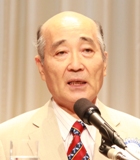Official Visit by the Governor
July 21, 2010
Mr. Misao Ueno
Governor, RI District 2580
Tokyo Edogawa Rotary Club
 ��I attended the International Assembly in San Diego this January as a governor-elect. The plenary session opened by the question posed by Mr. Ray Klinginsmith, RI President this year, asking ��Can you give a simple but precise answer to both Rotarians and non-Rotarians if you are asked ��What is Rotary?�ǡ� The President set the theme for 2010-11 as ��Building Communities – Bridging Continents,�� which responds to the above question. Taking this opportunity, let me give my personal views on ��What is Rotary?��
��I attended the International Assembly in San Diego this January as a governor-elect. The plenary session opened by the question posed by Mr. Ray Klinginsmith, RI President this year, asking ��Can you give a simple but precise answer to both Rotarians and non-Rotarians if you are asked ��What is Rotary?�ǡ� The President set the theme for 2010-11 as ��Building Communities – Bridging Continents,�� which responds to the above question. Taking this opportunity, let me give my personal views on ��What is Rotary?��
��I often quote the explanations made by Mr. Paul Harris on ��What is Rotary?�� summarized in the following three points. Firstly, Mr. Harris made a clear distinction between Rotary activities and religion. Secondly, he questioned what ethical concepts have existed from ancient times. Lastly, he questioned ��why do we need to adopt and conduct ethical concepts especially in our vocational lives in the modern society?�� Mr. Harris gave extensive explanations on ethical concepts and concluded that ��Rotary is not a religion, yet its concepts are in accord with religious doctrines.�� Mr. Harris beseeched us to follow the two rules, the golden rule and the silver one, written in the Holy Bible: ��Whatsoever you want men to do to you, do also to them�� (Matthew, Chapter 7) and ��Never do to another what you would hate to have done to you by another.��
��Let me touch upon the difference between ethics and religion. Religion is the ultimate state of self-denial by exercising altruism and restraining self-interest. On the other hand, ethics approve the ��self��. Should one pursue self-interest to an extreme, the state authority will punish such an act in order to maintain social order. This is exactly why the law is said to be the minimum standard of ethics. Ethics defined by Mr. Harris admit the ��ego��, with a wide range of ��minimum ethics at the bottom�� to almost reaching the ��state of religion at the top��. This was the key element for making Rotary the universal movement, because putting religious teachings into practice, demanding us to deny one��s own self, is not feasible for the majority of us.
��Mr. Harris also decided to draw a line between Rotary activities and religion as we have learnt from our history that when religion gets systematized, becomes powerful and entwined with the political authorities, it is detrimental. For example, countless people were recklessly killed when the crusaders went on an expedition for nearly 200 years. Although Judaism, Christianity and Islam were fundamentally the same, they have developed into exclusive monotheistic religions today. We must keep religions separate from political authority.
��Now let me turn to why we must practice ethical concepts especially in our vocational lives? Mr. Harris made a stopover in Japan on his way to China during the 1930s. During the meeting in Japan, he was asked why he had founded Rotary and answered immediately, ��Because I was lonely.��
��Mr. Harris founded Rotary in 1905. He had been a successful lawyer in Chicago 5 years before then, surviving the intense competition among money worshippers with virtually no business ethics. He also mentioned, ��Although I have many acquaintances, I have no friends.��
��Mr. Harris came to realize that he could get real affluence only through building friendship and regaining humanity. Thus, he called upon like-minded people and established a cross-industrial organization. Members gathered at weekly meetings with the belief that they should take a lead in rebuilding inter-personal relationships actively participating in the business circle which was then almost collapsing. ��We should be sincere to the business ethics and conduct business by putting ourselves in the other person��s place. This is how we can win trust and confidence, the key elements for continuous and profitable business.�� This is how our senior Rotarians have emphasized the significance of vocational services to be the ��centerpiece of Rotary activities��
��Each club must take immediate actions to implement vocational services based on voluntary spirit and the principle of ��I Serve,�� which will foster local communities and eventually bridge all the continents of the world. Each Rotarian should keep in mind the two mottos of Rotary that condense the principle of practical ethics: ��Service Above Self�� and ��One Profits Most Who Serves Best.�� Rotarians must keep a balance between fulfilling one��s own interest and rendering service to society.
��Now, how can we best convey the principle of Rotary to non-Rotarians? I often quote the old Japanese saying ��Give and it shall be given unto you,�� as kindness will eventually be repaid. Another expression used by the merchants of Omi (Shiga Prefecture today) in olden times ��serving the interests of all three parties (sellers, buyers, and society as a whole)�� is teaching the basic life philosophy of business leaders.
��Time has come for Rotarians to get back to the basics of Rotary and get engaged in the grass-root vocational service activities. This will surely make the world a better place for all.